
We can feel like our brain is under siege when bombarded by frequent migraine attacks. How can we optimize brain function when we experience chronic pain? Can we reverse the damage we’ve had? How do we know if our perceived cognitive decline is due to the natural process of aging, migraine itself, or the treatments we take for migraine? Whatever our diagnosis, brain care is for all of us.
To guide us, here is an Interview with Krystal L. Culler, DBH, MA, the Founder and Creative Director of the Virtual Brain Health Center, is a behavioral health doctor.
Is it possible to make positive changes for our brain and at any age?
Dr. Culler: Absolutely. Brain health is 90% lifestyle and only 10% genetics. And it’s never too late; brain care and brain health are for all of us, despite age and any type of diagnosis or health care concern we have. Brain plasticity is the life-long ability to adapt and change, and that happens through lifestyle choices. We have the ability to sculpt and mold our brains, which can be cumulative over time. We need to manage our health conditions actively, like migraine and any comorbidities, by working with our health care providers and taking a proactive role that enables us to play a part in that process.
What’s the connection between sleep, especially quantity, duration, and consistency for brain health?
Dr. Culler: Sleep is deeply restorative for our brain. At night, we’re able to clean out toxins that we accumulate throughout the day. It helps us restore memories of that day’s events. For that to happen, we need deep REM sleep. We need the optimal seven to nine hours. Many people believe the old myth: “I just need three to four hours, and that’s all I need to function.” That’s not true. You need to spend a third of your life sleeping if you want optimal health and well-being. That’s what brain health research shows.
For many of us, chronic pain or headaches can disrupt our sleep. But doing what we can to make sleep a priority, developing good sleep hygiene and putting a routine in place are priorities. That will help set us up for success.
How do stress management and building resilience relate to brain health?
Dr. Culler: Stress has a full-body impact. You want to think about different tools you can use so you can get your emotional response down, even a little bit. We’re all dealing with different stressors, so developing effective strategies is important.
For example, I encourage five-minute brain breaks. That can be anything that turns your brain off and lets you have fun, something that will uplift your spirit, that lets you play, or brings you joy. For example, go outside, feel the warmth of the sun on your face, explore nature, spend time with pets, put on music, or dance to your favorite song. Do anything that lets you unwind. And take those breaks frequently.
Watch the full interview for answers to:
Does the average person take good care of their brain?How much brain health results from genetics versus lifestyle choices?Can we take steps toward improving brain health at any age?How do we prioritize brain health focus even while managing chronic health conditions?What are 10 top-recommended tips for achieving optimal brain health?What is the connection between sleep and brain health?How do movement and exercise help rejuvenate the brain and what are realistic ways to obtain these benefits even while managing migraine?What impact does stress have on us and what simple strategies can we use to limit its effects on our health?How can we eat in ways that support optimal brain health?How does dehydration affect cognitive performance?What considerations do those living with migraine need to have regarding caffeine and alcohol?How is social connection relevant to health and well-being?What does the pursuit of lifelong learning do for brain health?Why is engaging the brain daily in new ways important?What are some strategies we can use to effectively “work out” our brains daily?Is meditation an effective tool in optimizing brain health?What impact does chronic pain have on the brain?Is migraine a risk factor for the development of dementia?Do migraine medications carry risks of short- or long-term cognitive impairment?Is cognitive decline inevitable with aging? How can a decline be avoided through the development of a “cognitive reserve”?How can people access screening for memory impairments?
Watch Dr. Culler’’s interview preview hereor order it as part of the Migraine World Summit package from this page